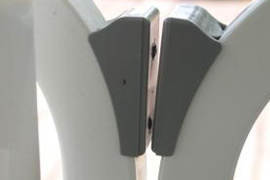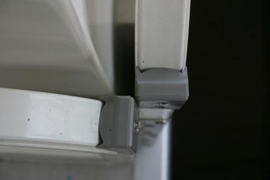

The Pontoon Boat Case
Our Kassel McVey Lawyers represented a client who suffered a severe injury on a pontoon boat while out on the lake with her family. She opened the boat gate to jump into the water. When she jumped, her right pinkie got caught between the gate and the safety railing, ripping her finger from her hand as she descended into the water.
Unfortunately, this was not a freak accident. In our investigation, we found that many pontoon boats have a design defect that causes exactly this kind of injury. In fact, we found over 15 other examples of mangled, injured and amputated pinkies, always on the hand placed on the rail as the person left the boat and entered the water.
The design of pontoon boat gates and railings is such that where the railing meets the gate, there is a curved slope downward. This curved design results in a pinch point where fingers can easily get wedged. Pontoon boat manufacturers have recognized the hazard the railing design creates and therefore came up with a guard to try to prevent contact with that pinch point. The Bentley boat our client was on had what is referred to as a ball guard. It works fairly well when the gate is closed, but once the gate is opened, the ball guard moves out of the way and does not guard the pinch point at all. At the time when the guard is most needed, it is not effective. The ball guard utterly fails to prevent contact with the hazard.
When our client went to jump into the water, she opened the gate and placed her right hand on the railing to balance herself before she jumped in. The ball guard, mounted onto the gate, moved out of the way of the pinch point when she opened the gate. As she descended into the water, her right hand moved along the railing, directly into the pinch point. Her pinkie finger was trapped in the pinch point and when combined with the downward velocity of her body as she entered the water, it was traumatically severed from her hand.
The manufacturer of a pontoon boat has a duty to use ordinary care to test, analyze and inspect its product. Even a cursory evaluation of the ball guard design would demonstrate its failure when the gate is opened. The manufacturer of our client’s boat, Bentley Industries, never tested the effectiveness of the guard. In fact during his deposition, the owner of Bentley stated that the company did not test the guard’s effectiveness and that there was no need for the guard to be adequate for its intended purpose. He stated that there was no other guard available besides the ball guard. However, we discovered that several years prior to the manufacture of our client’s specific boat, another pontoon manufacturer, Bennington, introduced a different guard – one that actually guards the pinch point when the gate is open. The Bennington device is called a “double-block guard.”
Not only did we discover that Bentley knew about the Bennington recall letter and the new guard, but we also uncovered a recall letter subsequently issued by Bentley that was nearly identical to the Bennington letter. Bentley effectively copied the Bennington letter, but not the guard used by Bennington. It wasn’t until January 2007 that Bentley began installing the “double-block guard” on its boat gates. Unfortunately, that was too late for our client.
We filed suit against Bentley Industries, based on negligence to properly and adequately guard against a hazard, as well as a products liability case for a defective and unreasonably dangerous product due to its design, manufacture and failure to warn.
Personal Injury Lawyers 1330 Laurel Street Columbia, SC 29201 Phone: 803-256-4242
Mailing Address
Post Office Box 1476
Columbia, South Carolina 29202
Fax: (803) 256-1952
Copyright © 2023 John D. Kassel, Attorney at Law, LLC. All rights reserved. Privacy Policy I Terms of Service | Disclaimer
This website is designed for general information only. The information should not be construed to constitute formal legal advice or the formation of a lawyer/client relationship. The results and testimonials listed on this website are specific to the facts and legal circumstances of specific cases and should not be used to form an expectation that the same results could be obtained for other clients in similar matters. This list is not a description or characterization of the quality of the firm's representation, it is not intended to compare one attorney's work to another and is in no way a guarantee of a specific result for your case.





